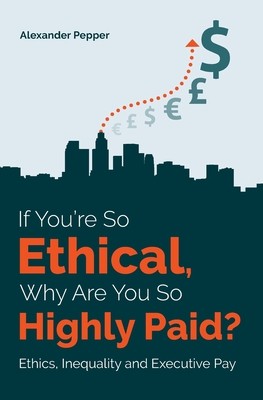
- We will send in 10–14 business days.
- Author: Alexander Pepper
- Publisher: Ubiquity Press (London School of Economics)
- ISBN-10: 1909890944
- ISBN-13: 9781909890947
- Format: 13.3 x 20.3 x 1.1 cm, minkšti viršeliai
- Language: English
- SAVE -10% with code: EXTRA
If You're So Ethical, Why Are You So Highly Paid? (e-book) (used book) | bookbook.eu
Reviews
Description
In the past 30 years, senior executive pay has increased dramatically in the UK, US and other developed countries, causing much debate and, at times, public outrage. In this book, Alexander ('Sandy') Pepper argues that this soaring inflation in high pay is the result of a market failure, leading to inefficient pay practices that are replicated across industries. Individual company's renumeration committees face a prisoner's dilemma, and so recommend over-the-odds payments in the vain hope of obtaining superior talent. For institutional investors, these developments have created a collective action problem, with many historically unwilling or unable to intervene to curtail excessive corporate pay.
But are executives themselves really the greedy, self-interested, fat cats of popular culture? Based on a thought experiment and survey of beliefs of over a thousand senior executives from around the world, Pepper and his colleagues found that business executives in fact tend not to justify their pay levels as if they were ethical egoists entitled to act entirely in their own self-interest. Instead, they expressed support for a range of ethical beliefs on inequality and distributive justice. They can be categorised as either welfare liberals, relational egalitarians, meritocrats or free marketeers. Many believe that in a civilised society everyone has the right to an income that is sufficient for a dignified life, and that companies, not just governments, have responsibilities in this respect. So, Pepper argues, it is the market failure in executive pay that has created such wage inflation at the top, and this ultimately requires an ethical response from investors, companies and executives.
This is a book for anyone who wishes to understand and tackle business's role in the growing social inequality of advanced economies in an informed, fair and feasible way.
EXTRA 10 % discount with code: EXTRA
The promotion ends in 22d.17:54:42
The discount code is valid when purchasing from 10 €. Discounts do not stack.
- Author: Alexander Pepper
- Publisher: Ubiquity Press (London School of Economics)
- ISBN-10: 1909890944
- ISBN-13: 9781909890947
- Format: 13.3 x 20.3 x 1.1 cm, minkšti viršeliai
- Language: English English
In the past 30 years, senior executive pay has increased dramatically in the UK, US and other developed countries, causing much debate and, at times, public outrage. In this book, Alexander ('Sandy') Pepper argues that this soaring inflation in high pay is the result of a market failure, leading to inefficient pay practices that are replicated across industries. Individual company's renumeration committees face a prisoner's dilemma, and so recommend over-the-odds payments in the vain hope of obtaining superior talent. For institutional investors, these developments have created a collective action problem, with many historically unwilling or unable to intervene to curtail excessive corporate pay.
But are executives themselves really the greedy, self-interested, fat cats of popular culture? Based on a thought experiment and survey of beliefs of over a thousand senior executives from around the world, Pepper and his colleagues found that business executives in fact tend not to justify their pay levels as if they were ethical egoists entitled to act entirely in their own self-interest. Instead, they expressed support for a range of ethical beliefs on inequality and distributive justice. They can be categorised as either welfare liberals, relational egalitarians, meritocrats or free marketeers. Many believe that in a civilised society everyone has the right to an income that is sufficient for a dignified life, and that companies, not just governments, have responsibilities in this respect. So, Pepper argues, it is the market failure in executive pay that has created such wage inflation at the top, and this ultimately requires an ethical response from investors, companies and executives.
This is a book for anyone who wishes to understand and tackle business's role in the growing social inequality of advanced economies in an informed, fair and feasible way.


Reviews